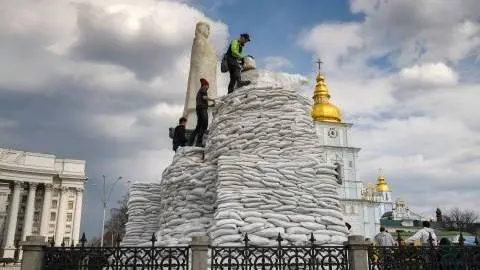There’s nothing normal about the global economy
Markets are suggesting we're returning to some sort of normality despite the ongoing carnage in Ukraine. I think they're wrong. Europe's facing a humanitarian and economic crisis that has spill over consequences for the rest of the world. No, this is not a return to normality
The markets are not always right
The war in Ukraine has entered its fifth week and financial markets seem to have returned to some sort of normality with stock markets recovering and the Russian ruble almost back to its pre-war level. There's an old saying that the market is always right. I'm not buying it this time around. Nothing about this war is normal. Every single second this war continues is not normal. On the contrary, the economic implications of the war, sanctions and self-sanctions have only just started to unfold and will continue to affect the global, and particularly the European economy for a long while.
As much as everyone is looking for guidance to gauge the global economic impact of the war, it is simply impossible to give this kind of certainty. If anything, the last two years of the pandemic have shown that economic models are not able to precisely predict the economic consequences of an unprecedented event. The only thing models and economists can currently do is to describe and analyse the channels through which the war in Ukraine might and will affect the global economy. Think of the impact and role energy and commodities currently play, how supply chains will be hit once again but also how inflation will remain higher for longer all while Europe is trying to finance an even faster green transition combined with higher defence spending.
Europe has to overcome its many challenges
Europe is particularly at the risk of losing international competitiveness as a result of the war. For the continent, the war is much more of a game-changer than the pandemic ever was. I'm not talking just in terms of security and defence policies but notably about the entire economy. The eurozone is now experiencing the downside of its fundamental economic model, that of an export-orientated economy with a large industrial backbone and a higher dependency on energy imports. It's certainly benefited from globalisation and the division of labour. Now's it's having to speed up the green transition and energy autonomy while at the same time increasing defence spending and the funding of ongoing investment initiatives to improve digitalisation and education. It's quite the challenge.
But it's a challenge that can and actually must succeed. If and when it does, Europe should be well-positioned. But the pressure on household finances and incomes will remain huge until it gets there. Corporate profits, meanwhile, will remain high.
Europe is facing a humanitarian crisis and significant economic transition. The war is taking place in the 'breadbasket' of Europe, a key production area for grain and corn. Food prices will rise to unprecedented levels. Higher inflation in developed economies could be a matter of life and death in developing economies.
No. Financial markets are misguided. There's no return to any sort of normality of any kind right now.
Our key calls this month
- Oil to average $103/bbl in the second quarter. We see a risk of a spike higher to $150/bbl if the EU sanctions Russian oil.
- A best-case scenario could see Europe substitute 55% of Russian gas pipeline flows this year, mostly via additional LNG cargoes.
- The US Federal Reserve is set to hike rates by 50 basis points (bp) in May, June and July. Further 25bp hikes will take the funds rate to 3% by early-2023.
- The war in Ukraine could be worse than the pandemic for the Eurozone economy. We expect a negative second-quarter growth reading for the region. Fiscal policy is unlikely to be accommodative enough to prevent a marked slowdown.
- With eurozone inflation set to spike, we expect the ECB to stick to its plan of removing exceptional policy measures. That means the end of net asset purchases in the third quarter and a rate hike in the fourth.
- The UK economy will also experience a fall in GDP in the second quarter and that means the Bank of England is likely to pause its rate hike cycle by summer.
- A rise in Covid-19 cases means the People’s Bank of China is likely to loosen policy via a targeted cut in the Reserve Requirement Ratio.
- The US 10-year will rise further to 2.75% in the second quarter. We expect EUR/USD to move to 1.08-1.09 by the summer.
This publication has been prepared by ING solely for information purposes irrespective of a particular user's means, financial situation or investment objectives. The information does not constitute investment recommendation, and nor is it investment, legal or tax advice or an offer or solicitation to purchase or sell any financial instrument. Read more
Download
Download article
31 March 2022
ING Monthly: There’s nothing normal about the global economy This bundle contains 17 Articles